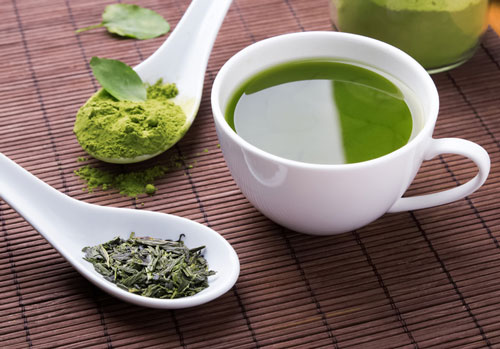Green tea has long been linked to a wide range of health benefits.
Studies have shown it fights arthritis, prevents cancer, reduces the risk of Alzheimer’s, eases anxiety, and more.
Now a new study shows that this ancient Asian health elixir may be a dieter’s best friend.
It was published in the Journal of Nutritional Biochemistry. Scientists examined green tea’s effects on obesity.[1]
They fed food mixed with green tea extract to mice that were obese. They fed other obese mice the same food without green tea. Then they measured the rodents’ weight and insulin resistance.
They also gauged factors relating to the animals’ gut microbiome. This is the community of bacteria that live in the intestines. It can have profound effects on health.
After eight weeks, the researchers found that the mice that got green tea gained about 20% less weight than those that didn’t get green tea. The green tea mice also had lower insulin resistance.
Researchers concluded that green tea promotes a healthier gut microbiome, which leads to less weight gain.
Green tea was also found to reduce inflammation in the guts and in fat tissue. And it reduced a toxic bacterial component called endotoxin that is linked to serious infections.[2]
Furthermore, green tea reduced “leaky gut.” This is a digestive condition in which bacteria and toxins are able to leak through the intestinal wall into the bloodstream. This can trigger inflammation and a wide range of illnessess, including heart disease.
Professor Richard Bruno was the study’s lead author. He said the green tea consumption used in the study would equal about 10 cups of green tea a day for a human.
“It might seem like a lot of tea, but it’s not highly unusual in certain parts of the world,” said Professor Bruno.[3]
Not All Green Tea Is Created Equal
Green tea’s catechin content is what’s behind the benefits described in the study. Green tea contains the most powerful catechin of them all, EGCG.
EGCG, which is short for epigallocatechin gallate, may be nature’s most potent antioxidant. It is at least 100 times more powerful than vitamin C.
But not all green teas have the same amount. Matcha tea comes from young green tea leaves grown in the shade. This causes the tea to have more EGCG and up to twice the antioxidant power and nutrients of regular green tea.[4]
You can find matcha tea at your local health food store, or, if there is one in your neighborhood, a tea shop. If you can’t find it there, it’s easy to order online. You’ll find that it tastes much like regular green tea, but slightly stronger. Make sure you order a brand that is organic.
ECGC supplements are also available. The suggested daily dosage is 400 mg. It’s best if you divide the dosage, taking 100 mg four times a day.
One last and important piece of information: Never drink green tea or take EGCG supplements when you are eating foods high in iron or taking an iron supplement.
The iron molecules bind to the EGCG. This stops your body from absorbing EGCG. Wait at least two hours after consuming foods with iron before you drink green tea. Iron-rich foods include liver, beef, lentils, spinach, sardines, and pistachios.[5]
Related Articles
Never Do This With Your Tea
Never Drink Green Tea With This Mineral
Drink Tea to Lose Weight Without Dieting
[1]https://www.ncbi.nlm.nih.gov/pubmed/30856467
[2] https://en.wikipedia.org/wiki/Lipopolysaccharide
[3]https://www.eurekalert.org/pub_releases/2019-03/osu-gtc031319.php
[4]http://matchasource.com/health-benefits-of-matcha-tea/
[5]https://www.institutefornaturalhealing.com/2016/04/never-drink-green-tea-with-this-mineral/

